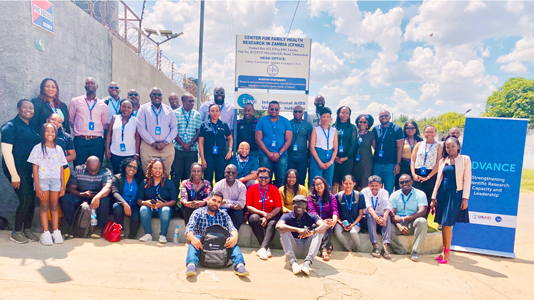March 9, 2023
IAVI kicks off second cohort of Leadership Development Program
Strengthening research and science leadership capacity of early- and mid-career research scientists in Africa and India.
IAVI has kicked off the second cohort of the Leadership Development Program (LDP) to establish a critical mass of promising scientific leaders who will play a vital role in advancing the field of HIV vaccine research and development in Africa and India.
Supported by the U.S. Agency for International Development (USAID), the LDP reinforces the commitment of IAVI’s ADVANCE program to foster a core group of researchers and scientists in African and Indian institutions who are contributing to the global effort to identify, evaluate, and implement HIV vaccines and biomedical prevention products. ADVANCE is a 10-year cooperative agreement with the U.S. President’s Emergency Plan for AIDS Relief (PEPFAR) aimed at accelerating the development of vaccines and new technologies to combat the AIDS epidemic.
 The first cohort of LDP Participants, alongside IAVI staff, pose for a group photo outside CFHRZ in Lusaka, in December 2022.
The first cohort of LDP Participants, alongside IAVI staff, pose for a group photo outside CFHRZ in Lusaka, in December 2022.
The LDP, targeted at early- and mid-career research scientists within the ADVANCE partner network in Kenya, Uganda, Rwanda, Zambia, South Africa, and India, is an integral part of IAVI’s capacity strengthening initiative. By providing trainings in technical and soft skills, mentorship and grantsmanship support, and broadening participants’ expertise to effectively manage diverse research portfolios, the LDP aims to develop a critical mass of promising leaders who are uniquely equipped to advance the field for a next-generation AIDS vaccine.
“As we commence the second cohort of our Leadership Development Program, we remain steadfast in our commitment to develop a core group of scientific leaders who will be the driving force behind the next-generation AIDS vaccine,” said Daniel Ochiel, senior director, laboratory, Africa, and the lead for capacity strengthening at IAVI. “Capacity strengthening programs like the LDP are essential in empowering the ADVANCE network to shape the research agenda and make meaningful contributions to global health,” he added.
The second cohort of LDP consists of 25 participants, comprising 14 female and 11 male early- and mid-career research scientists. The participants include laboratory technologists, clinical trial managers, scientists undertaking their post-doctoral studies, medics, senior scientists, and post-docs. They are diverse in basic research and translational research. The program will run throughout 2023 and conclude with graduation at the end of the year.
During the launch of the second cohort, Terry Muhomah, postdoctoral researcher, KAVI-Insititute of Clinical Research presented her expectations for the new cohort, highlighting the need for participants to develop managerial skills in three key areas: management, growth, and grant or funds management.
“As we enter this program, we are confident that we are setting ourselves on a trajectory to not only sit at the table where the research agenda is set both regionally and globally, but to also play a meaningful role in shaping and driving HIV and other infectious disease research in Africa and the world,” said Muhomah.
Prof. Linda-Gail Bekker spoke on the ins and outs of academic mentoring, advising participants to be proactive, adopt a learning orientation, and set smart goals. She acknowledged that LDP is an incredible opportunity for participants to develop critical managerial skills, receive mentorship and grantsmanship support, and broaden their expertise to manage diverse research portfolios.
William Kilembe, project director for the Centre for Family Health Research in Zambia, spoke on behalf of the clinical research center (CRC) partners, highlighting LDP’s benefits for developing a critical mass of next-generation scientific leaders with prioritized soft and scientific skills and research management skills. “We believe the LDP is a crucial initiative in the fight against HIV, and its impact will undoubtedly be felt for years to come as it develops a new generation of scientific leaders,” said Kilembe.
During the launch, it was also noted that LDP’s success can be seen in the achievements of its previous cohort, which included the award of two grants, new collaborations, expanded mentorship, and nomination of a previous participant to the International AIDS Society (IAS) vaccine Global Enterprise technical working group. The LDP is a collaborative effort supported by various partners, including USAID, CRC leaders, Africa Research Excellence Fund as implementing partners, IAS, and Skating Panda.
LDP is designed to be a relevant, experiential learning process that participants can immediately apply to their daily work. As an improvement based on learnings from the previous cohort, the program is designed to provide a comprehensive curriculum, expert facilitators, and a grant writing workshop that includes peer review sessions. With this, it seeks to equip its participants to become the driving force behind HIV and other infectious disease research in Africa and the world. The second cohort of the LDP is poised to build on the successes of the previous cohort and contribute meaningfully to the research agenda, both regionally and globally.